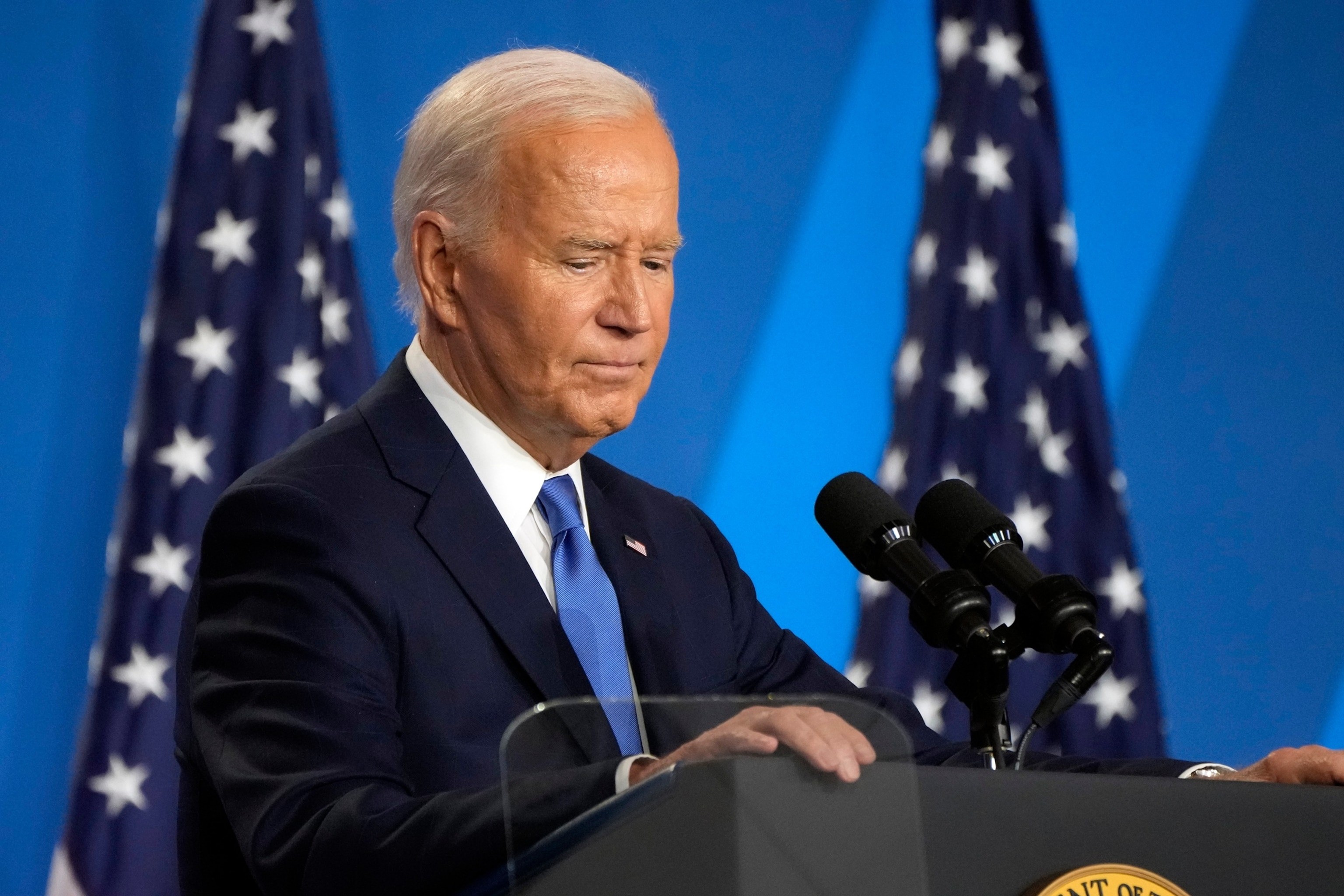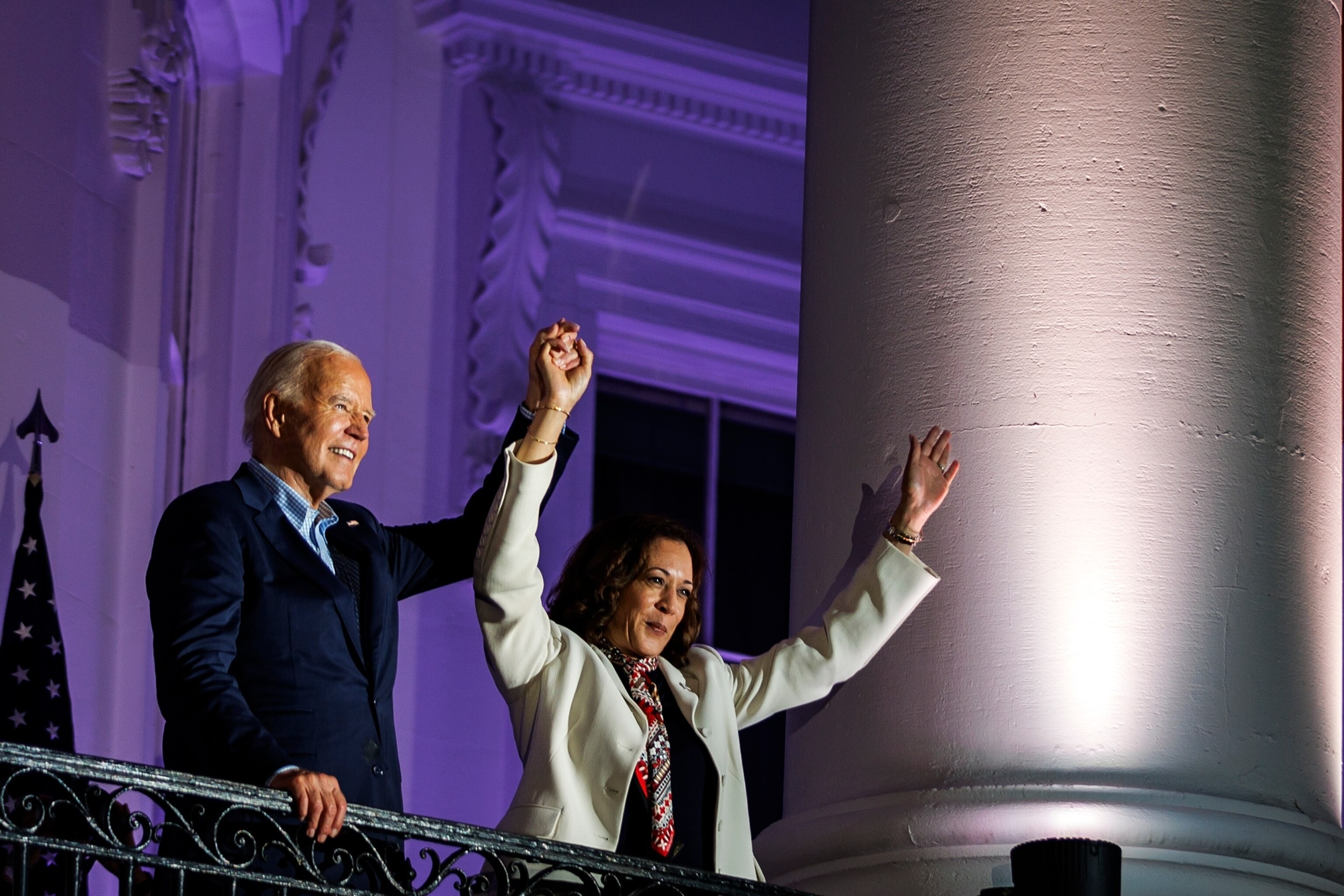The question, Why Did Biden Withdraw, has been on the minds of many, especially after his surprising announcement. WHY.EDU.VN delves into the multifaceted reasons behind this decision, offering clarity amidst speculation. Explore the rationales, political landscape, and potential impacts of this pivotal moment, understanding the dynamics that shaped this choice. Dive into detailed analysis and expert insights, discovering credible answers to key questions surrounding this major political move.
1. The Unexpected Announcement: Biden’s Withdrawal Shocks the Nation
President Joe Biden’s decision to withdraw from the reelection race sent shockwaves through the political landscape. Just days after reaffirming his commitment to the campaign trail, Biden announced his decision, leaving both supporters and opponents surprised. The announcement, made on a Sunday morning, marked a significant turning point in the upcoming election, raising questions about the motivations behind this sudden shift.
The initial statement released by Biden conveyed a sense of duty and prioritization of the country’s interests: “It has been the greatest honor of my life to serve as your President,” Biden said. “And while it has been my intention to seek reelection, I believe it is the best interest of my party and the country for me to stand down and focus solely on fulfilling my duties as President for the remainder of my term.” This message suggested a selfless decision, but it left many wondering about the underlying factors that led to it.
2. Mounting Pressure from Within: Democratic Voices Urging Biden to Step Aside
Despite public assurances from the White House and Biden himself, pressure had been building within the Democratic Party for him to step aside and make way for a stronger candidate. This internal pressure played a significant role in shaping Biden’s ultimate decision. The calls for withdrawal grew louder as the election cycle progressed, influenced by concerns over Biden’s age, approval ratings, and ability to effectively campaign against potential Republican rivals.
Key Factors Contributing to Internal Pressure:
- Age Concerns: At 81 years old, Biden’s age became a recurring point of discussion, with some questioning his stamina and ability to handle the rigors of a demanding campaign and a second term in office.
- Approval Ratings: Fluctuating approval ratings added to the uncertainty surrounding Biden’s reelection prospects. Concerns about his performance on key issues, such as the economy and foreign policy, contributed to calls for a change in leadership.
- Poll Numbers: Disappointing poll numbers, particularly in swing states, raised alarms among Democrats, leading some to believe that a different candidate would have a better chance of winning the election.
3. Key Democratic Figures: Influential Voices Calling for a New Generation
The pressure on Biden to withdraw was amplified by prominent figures within the Democratic Party who publicly voiced their support for a new generation of leadership. These influential voices added weight to the growing sentiment that Biden should pass the torch to someone younger and more dynamic.
Senator Joe Manchin, for example, openly encouraged Biden to “pass the torch to a new generation.” Manchin, known for his moderate stance and independent voice, emphasized the need for fresh leadership to address the challenges facing the country.
Statements from Key Democratic Figures:
| Name | Position | Statement |
|---|---|---|
| Sen. Joe Manchin | Senator, I-W.Va. | “I come with a heavy heart to think the time has come for him to pass the torch to a new generation.” |
| Chuck Schumer | Senate Democratic Leader | (Reportedly) Had a heart-to-heart talk with Biden about leaving the race. |
| Frank Biden | President Biden’s youngest brother | “It really boils down to this: it has to do with his overall health and vitality… he’s a proud guy, it pisses him off that he shuffles when he walks.” |


The growing chorus of voices urging Biden to step aside created a sense of urgency and intensified the pressure on him to reconsider his reelection bid.
4. Behind the Scenes: The Role of Jill Biden and Close Advisors
While the public pressure on Biden was evident, behind-the-scenes discussions and counsel from close advisors also played a crucial role in his decision-making process. First Lady Jill Biden, known for her unwavering support and trusted counsel, was particularly influential in helping the president weigh his options.
Jill Biden’s communications director, Elizabeth Alexander, noted that she “was supportive of whatever road he chose.” This statement highlighted the First Lady’s commitment to supporting her husband’s decision, regardless of the path he ultimately took.
In addition to Jill Biden, other close advisors and family members engaged in discussions with the president, offering their perspectives on the potential implications of his decision. These conversations provided Biden with a comprehensive understanding of the political landscape and the potential consequences of his choices.
5. Health and Vitality Concerns: A Personal Consideration
Adding a layer of complexity to the situation were concerns about President Biden’s health and vitality. While the White House consistently maintained that the President was fit for office, questions lingered about his ability to withstand the rigors of a demanding campaign and a full second term.
Frank Biden, the President’s youngest brother, openly discussed the impact of these concerns on the family. He emphasized that the decision was related to Biden’s overall health and vitality, not cognitive abilities. “He’s a proud guy, it pisses him off that he shuffles when he walks,” Frank Biden said, highlighting the personal toll that age-related physical challenges had taken on the President.
It is important to note that a source close to the Biden family disputed Frank Biden’s account, stating that he hadn’t spoken to the President in weeks and that health was not a factor in the decision. This conflicting information underscores the complexity of the situation and the different perspectives surrounding Biden’s motivations.
6. The Disastrous Debate: A Turning Point in Public Perception
The televised debate between President Biden and former President Donald Trump marked a significant turning point in public perception. Many viewers felt that Biden’s performance was lackluster and that he struggled to effectively articulate his policies and counter Trump’s attacks.
The debate was widely criticized by political analysts and commentators, who pointed to Biden’s stumbles, verbal miscues, and perceived lack of energy. The negative reviews fueled concerns about his ability to effectively campaign against Trump and win the election.
Following the debate, Biden’s approval ratings dipped, and calls for him to withdraw from the race intensified. The event served as a catalyst for renewed scrutiny of his age, health, and overall fitness for office.
7. Endorsing Kamala Harris: Paving the Way for a New Leader
In his announcement, President Biden made it clear that he was endorsing his Vice President, Kamala Harris, to lead the party’s ticket. This endorsement signaled his confidence in Harris’s ability to carry on his agenda and lead the country forward.
Harris, who had served as Biden’s running mate since 2020, expressed her gratitude for his leadership and praised his accomplishments as president. “On behalf of the American people, I thank Joe Biden for his extraordinary leadership as president of the United States and for his decades of service to our country,” Harris said.
Biden’s endorsement of Harris positioned her as the frontrunner for the Democratic nomination and set the stage for a new chapter in the party’s leadership.
8. Political Calculations: Assessing the Best Path Forward for the Party
Ultimately, Biden’s decision to withdraw from the reelection race was likely driven by a combination of factors, including pressure from within the party, concerns about his age and health, and a desire to pave the way for a new generation of leadership. However, political calculations also played a significant role in his decision-making process.
Biden and his advisors carefully assessed the political landscape, weighing the potential risks and rewards of a reelection campaign against the benefits of stepping aside and allowing another Democrat to run. They considered factors such as Biden’s approval ratings, poll numbers, fundraising capabilities, and the overall mood of the electorate.
Based on this assessment, Biden concluded that it was in the best interest of his party and the country for him to withdraw from the race and allow another candidate to lead the Democratic ticket. This decision reflected a strategic calculation aimed at maximizing the party’s chances of retaining the presidency in the upcoming election.
9. The Letter to the Nation: A Reflection on Service and Duty
In a letter to the nation, President Biden elaborated on his decision to withdraw from the reelection race, emphasizing his sense of duty and his commitment to serving the country. While the letter did not delve into the specific reasons behind his decision, it conveyed a message of selflessness and a desire to prioritize the nation’s interests above his own.
“And while it has been my intention to see reelection, I believe it is in the best interest of my party and the country for me to stand down and to focus solely on fulfilling my duties as President for the remainder of my term,” Biden wrote.
The letter served as a final farewell to the campaign trail and a reaffirmation of his commitment to fulfilling his responsibilities as president until the end of his term.
10. Looking Ahead: The Future of the Democratic Party and the 2024 Election
President Biden’s decision to withdraw from the reelection race has profound implications for the future of the Democratic Party and the 2024 election. With Biden out of the picture, the Democratic field is now open, and a new generation of leaders will have the opportunity to compete for the party’s nomination.
Kamala Harris, as Biden’s endorsed successor, is widely considered to be the frontrunner, but other potential candidates may emerge in the coming months. The race for the Democratic nomination is likely to be competitive and closely watched, as the party seeks to identify a leader who can unite its diverse factions and defeat the Republican nominee in the general election.
The 2024 election will be a pivotal moment for the country, as voters choose between competing visions for the future. With President Biden stepping aside, the election will usher in a new era of leadership and set the course for the nation for years to come.
11. The Weight of the Office: Acknowledging the Demands of Leadership
Another contributing factor to Biden’s withdrawal may have been a deep understanding of the sheer weight and demands of the presidency. Serving as the leader of the free world takes an immense toll, both physically and mentally. The constant pressure, endless decision-making, and relentless scrutiny can wear down even the most seasoned politicians.
Perhaps Biden recognized that the energy and focus required for another four years in office would be better served by someone younger and with a fresh perspective. This recognition would align with his stated desire to prioritize the country’s best interests, even if it meant sacrificing his own political ambitions.
12. The Desire for Unity: Avoiding a Divisive Primary Battle
In addition to health and political considerations, Biden may have also been motivated by a desire to promote unity within the Democratic Party. A contested primary battle could have been divisive and damaging, potentially weakening the party’s chances in the general election.
By stepping aside and endorsing Kamala Harris, Biden may have hoped to avoid such a scenario and rally the party around a single candidate. This would allow the Democrats to focus their resources and energy on defeating the Republican nominee, rather than fighting amongst themselves.
13. The Impact of Project 2025: A Concern for Democracy
Biden’s statement just days before his withdrawal, where he mentioned “the threat of Donald Trump’s Project 2025 agenda,” suggests that concerns about the future of American democracy may have also influenced his decision. Project 2025 is a conservative plan for the next presidential administration that has been criticized by Democrats for its potential to undermine democratic institutions and roll back civil rights.
Biden may have concluded that his withdrawal would be the most effective way to prevent Trump and his agenda from returning to power. By paving the way for a younger, more dynamic candidate, he may have hoped to energize the Democratic base and create a stronger challenge to the Republican nominee.
14. Family Considerations: Prioritizing Personal Well-being
The presidency is not only demanding on the individual holding office but also on their family. The constant public attention, security concerns, and sacrifices required can strain relationships and take a toll on personal well-being.
Biden, who has experienced personal tragedy in his life, may have decided that the time had come to prioritize his family and their needs. Stepping down from the presidency would allow him to spend more time with loved ones and enjoy a more private and peaceful life.
15. The Legacy of a Statesman: Securing a Place in History
Finally, Biden may have been motivated by a desire to secure his legacy as a statesman and a leader who put his country first. By withdrawing from the reelection race, he could position himself as someone who was willing to sacrifice his own ambitions for the greater good.
This act of selflessness could enhance his reputation and ensure that he is remembered as a president who prioritized the needs of the nation above his own political career.
In conclusion, the reasons behind Biden’s withdrawal are complex and multifaceted. Pressure from his party, health and vitality worries, the disastrous debate, and a sincere wish to open the door for a new generation of leaders all came together. Factors such as ensuring party unity, issues about Project 2025, family considerations, and cementing his legacy as a statesman certainly played a role. The final outcome has had a profound influence on the Democratic Party’s direction and the 2024 election, paving the stage for a new chapter in American politics.
FAQ: Understanding Biden’s Decision
Here are some frequently asked questions about President Biden’s decision to withdraw from the reelection race:
| Question | Answer |
|---|---|
| What were the main reasons for Biden’s withdrawal? | A combination of factors, including pressure from within the Democratic Party, concerns about his age and health, the impact of a disastrous debate performance, and a desire to pave the way for a new generation of leadership. |
| Did his health play a significant role? | While the White House maintained that Biden was fit for office, concerns about his health and vitality were a recurring theme in discussions about his reelection prospects. |
| Who is likely to replace him as the Democratic nominee? | Vice President Kamala Harris, as Biden’s endorsed successor, is widely considered to be the frontrunner. |
| How will this affect the 2024 election? | Biden’s withdrawal has opened up the Democratic field and created new uncertainties about the outcome of the 2024 election. |
| What was the impact of the debate with Donald Trump? | The debate was widely criticized and fueled concerns about Biden’s ability to effectively campaign against Trump. |
| Was Jill Biden involved in the decision? | Yes, Jill Biden played a supportive role and offered her counsel to the president as he weighed his options. |
| Did other Democratic figures influence his decision? | Yes, prominent Democratic figures like Sen. Joe Manchin publicly called for Biden to step aside and make way for a new generation of leadership. |
| What did Biden say in his letter to the nation? | Biden emphasized his sense of duty and his commitment to serving the country, but he did not delve into the specific reasons behind his decision. |
| How does this affect the future of the Democratic Party? | Biden’s withdrawal has created an opportunity for a new generation of leaders to emerge and shape the future of the Democratic Party. |
| Was there any disagreement within the Biden family about this decision? | Yes, while Frank Biden suggested health was a major factor, a source close to the family disputed this, highlighting the different perspectives surrounding Biden’s motivations. |
Uncover More Insights with WHY.EDU.VN
Navigating complex issues like this can be challenging, but at WHY.EDU.VN, we’re dedicated to providing clarity and understanding. If you’re seeking answers to pressing questions or want to explore diverse perspectives, our platform offers a wealth of knowledge and expert insights.
Do you have more questions about political events, historical moments, or scientific breakthroughs? Visit WHY.EDU.VN today to ask your questions and connect with experts who can provide the answers you seek. Our community is here to support your quest for knowledge. Contact us at 101 Curiosity Lane, Answer Town, CA 90210, United States, or via Whatsapp at +1 (213) 555-0101. Let why.edu.vn be your guide to a world of information and understanding.
